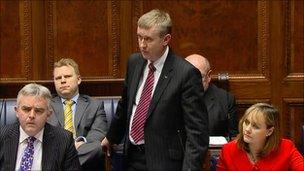School closures must be equally distributed across all sectors - Storey
- Published

DUP MLA Meryn Storey said he was concerned about the impact of the new proposals
The chairman of the Education Committee Mervyn Storey has said plans to overhaul the system and which could lead to school closures "lack focus".
On Monday John O'Dowd told the assembly he has ordered an audit of every school, starting with post primaries.
The minister said he was determined to improve the quality of education even if it meant having to close schools.
But Mr Storey said he feared the controlled sector could be unequally penalised.
"It is very clear that as a result of yesterday's statement there will be a loss of jobs and a loss of schools," he said.
"The issue for me and for people with an interest in education is where are these schools going to be.
"I'm very focused and determined that there will be an equality of distribution, rather than what has seemed to be the case to date with one sector taking a disproportionate hit over another."
Speaking in the assembly on Monday, Mr O'Dowd said there are too many empty places in schools, now up to 85,000 equating to more than 150 empty schools.
He said "difficult, sometimes unpopular, but necessary decisions" will have to be taken to reduce that number.
However, he said there will be a possibility of popular, oversubscribed schools expanding to take more pupils.
New look
"We must prioritise the needs of children over institutions," he told the assembly.
The minister said he was not bringing in any new policies but was stepping up the pace of action under existing rules.
"We have too many schools that do not have the capacity to give children the broad and rich educational experience they deserve," said the minister
"Schools which, in some cases, have lost the confidence of the parents, pupils and communities they were built to serve.
"A third of our 863 primary schools have fewer than 100 children enrolled and a fifth of our 217 post-primary schools have fewer than 400 pupils.
"However, sustainable schools are not simply a numbers game. Schools will be measured against the six principles of the sustainable schools policy."
"Clear criteria"
BBC NI Education Correspondent Maggie Taggart said that the schools which believed they had approval for new buildings will now be looked at again to make sure they are necessary.
A more imaginative and flexible approach is needed, according to the minister, and does not always mean a brand new building. It could mean sharing facilities and making smaller improvements at a lower cost.
"Action is needed to restructure our schools estate to ensure it is capable of meeting the needs of our children in the future, is affordable and represents the best and most effective use of tax payers' money," said Mr O'Dowd.
"I must be certain that we are investing our resources in the right schools. It is my intention to set out clear criteria for access to capital investment in the near future.
"These criteria will be founded on the sustainable schools policy and the requirement that any proposal is founded in an area plan agreed by the sectors and approved by my department."
The minister is also to crack down on schools which ask pupils to leave when they do not suit the school's needs - in other words when they don't get good enough results.
He said he will give schools temporary flexibility on how many subjects they need to offer at GCSE and in sixth form.
By 2015, schools will have to eventually offer 24 subjects in fifth form and 27 in sixth form.
The department lost £700m from its budget for the next four years after cuts by Westminster to the block grant.
- Published26 September 2011
- Published26 September 2011
- Published26 September 2011
- Published21 September 2011